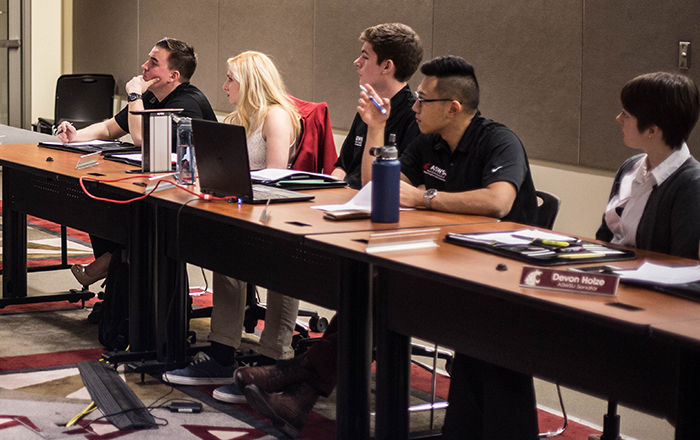Balancing a student-driven budget process
Becoming involved in ASWSU allows students to have a voice in the budget process. The ASWSU Senate attends a weekly meeting on Jan. 11.
January 19, 2017
You may not be able to judge a book by its cover, but you can judge a university by its budget process. WSU aims to be world-class in its fiscal transparency, but that does not mean the process maximally involves students and faculty.
Specifically, the WSU biennial budget – which involves little things like tuition and research funding – disproportionately affects all aspects of student life compared to how little impact students have in its overall creation.
The WSU budget is in fact two budgets, the operating budget and the capital budget. The first maintains the day-to-day expenses of administration, outreach, instruction and research. The second is for all physical improvements to university property and facilities across all WSU campuses.
According to the 2017 to 2019 Operating Budget Request under consideration in Olympia, three areas included in tuition fees that are directly impacted by the input of students are technology fees, services and activities fees and the so-called “other mandatory fees.” This last item can only be changed by student referendum per ASWSU legislation.
The budget request documents indicate that students have direct control over a maximum total of $906; note that WSU resident undergrads pay $5,569.74 in tuition per semester, and non-residents pay $12,885.74 per semester.
WSU President Kirk Schulz acknowledged the need to reform the budget process in a campus-wide email sent out on Nov. 30.
“I want to be as transparent as possible with our financial operations, so I will provide regular budget updates,” Schulz wrote.
Again, this indicates no explicit ability on the part of students to directly change items and allocations in the biennial budget.
To his credit, Schulz has made strident efforts to include as many non-administrators as possible in town halls and other opportunities for input from all WSU campuses. However, the actual process needs to be less administrative and more democratic with regard to the interests and needs of everyone it impacts.
Though changes have been made to improve the integrity and fiscal responsibility underlying the university’s budget process, the foundational ethic behind the budget has not changed: creating a better business, which is not necessarily equivalent to creating a better university.
For now, students only have real influence at the legislative level – the last part of the budget process. This means the administration has fully ingrained its vision of the WSU budget into lawmakers’ minds before students have any opportunity to change it.
Paige Campbell, ASWSU director of legislative affairs, asserts that lawmakers in Olympia genuinely care about student interests.
“They want to know your opinion,” she said. “(Our lawmakers) are definitely thinking about the students.”
Campbell also highlighted the opportunities available for students to get involved during the legislation process by joining the legislative affairs lobbying team, joining ASWSU’s delegation to the capitol in late February during Coug Day and writing letters to local representatives.
However, more should be done to make this process inclusive of student and faculty interests from beginning to end. The budget process should be a collegial effort, where the regents work in concert with students, faculty and administration representatives to create the biennial budget proposal for the state Legislature.
In this, WSU has an opportunity to pioneer how universities negotiate the strenuous budget process. Through these sorts of changes to the WSU budget process, university leadership could demonstrate its commitment not only to world-class research and market visibility, but also the fundamental mission of education that forms the cornerstone of WSU’s land grant university identity.
Tyler Laferriere is a graduate student pursuing his master’s in economics from Phoenix, Arizona. He can be contacted at 335-2290 or by [email protected]. The opinions expressed in this column are not necessarily those of the staff of The Daily Evergreen or those of The Office of Student Media.






















